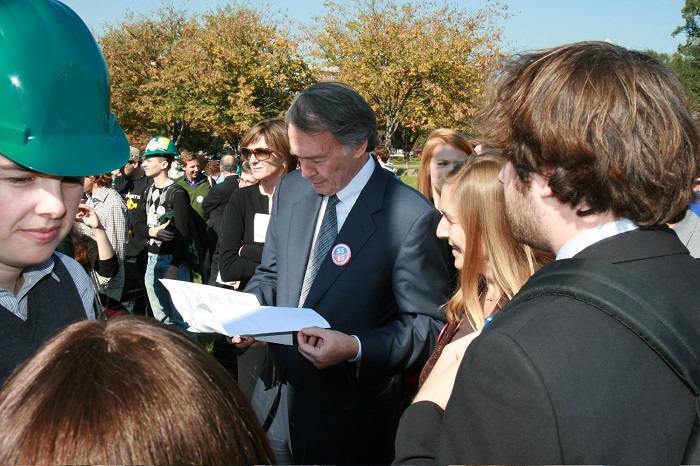EarthTalk®
From the Editors of E – The Environmental Magazine

Massachusetts Senator Edward Markey is a leading light in Congress on sustainability issues and has worked hard championing the green bank concept. Credit: Fritz Myer, FlickrCC.
Dear EarthTalk: What is the EPA’s new Green Bank all about? — Rick D., Asheville, NC
The U.S. Environmental Protection Agency (EPA) recently proposed the creation of a so-called green bank, known as the Greenhouse Gas Reduction Fund (GGRF) to help leverage the power of traditional financial markets in solving the climate crisis. Investing in carbon offset projects from lower income communities across the United States, the GGRF, at face value, has a social-ecological conscience. However, beneath the guise of green goodwill, darker forces are at play.
As a by-product of the Inflation Reduction Act (IRA), there are fears that the GGRF is a ‘green trojan horse’ created to give fossil fuels another chance and push out foreign business. “The IRA is rife with corporate giveaways and handouts aimed at allowing the fossil fuel industry to continue business as usual,” says Ebony Twilly Martin, the Executive Co-Director of Greenpeace USA. Meanwhile, Frederick Erixon, the Director of the European Centre for International Political Economy adds that the European Union (EU) has concerns about the discrimination inherent in the IRA: “Many of the IRA policies take an ‘America first’ attitude that will hurt European green industries and cleantech.”
Furthermore, the new independent national green bank, by virtue of its association with the IRA, may struggle to convince a crucial player in the climate war, the risk-averse private sector, to invest in the development of low emissions services and products from disadvantaged communities.
Delegates to the Conference of the Parties to the United Nations Framework Convention on Climate Change (COP27) stressed that not enough finance is supplementing the right sectors of the economy to create green technologies and infrastructure.
In theory, championing green banks as an effective means of financing climate action and optimizing social-ecological system resilience is a good idea — especially for communities that have been left behind in the transition to cleaner energy, transport and living. However, green bank models like the GGRF can only succeed when detached from the design of coal barons, protectionist policies and political squabbling.
Global biodiversity is in the headlights of the climate crisis. With a burgeoning population of 8 billion, humans must take account of our carbon footprint and develop innovative strategies that lift nature and all walks of society to reduce our impact. Green banks can be part of ‘the solution’ but must first escape fossil fuel interests and discriminatory bills to coax the private sector to follow them into a brave new world of green financing.
“The climate test is simple. It requires jobs, justice and restoration of the environment,” says Edward Markey, U.S. Senator from Massachusetts. An independent national green bank could be the answer. Through the GGRF, funding can be leveraged to advance green initiatives and infrastructure in disadvantaged communities while creating good, local jobs.”
With less than six months for EPA to distribute funds to eligible projects across the U.S., stakeholder input on the implementation, design and structure of the GGRF is currently being sought. Now is the time for the public to question the evolution and motives of the scheme, so that when a national green bank does arrive, it is truly transformational to the global economy, ecology and climate.
CONTACTS:
The Inflation Reduction Act: the Good, the Bad, and the Ugly, greenpeace.org/usa/the-inflation-reduction-act-the-good-the-bad-and-the-ugly
“EPA Moves Ahead on Green Bank: Opportunity to Weigh In Is Now,” hklaw.com/en/insights/publications/2022/10/epa-moves-ahead-on-green-bank-opportunity-to-weigh-in-is-now
EarthTalk® is produced by Roddy Scheer & Doug Moss for the 501(c)3 nonprofit EarthTalk.
See more at https://emagazine.com
To donate, visit https//earthtalk.org
Send questions to: question@earthtalk.org
